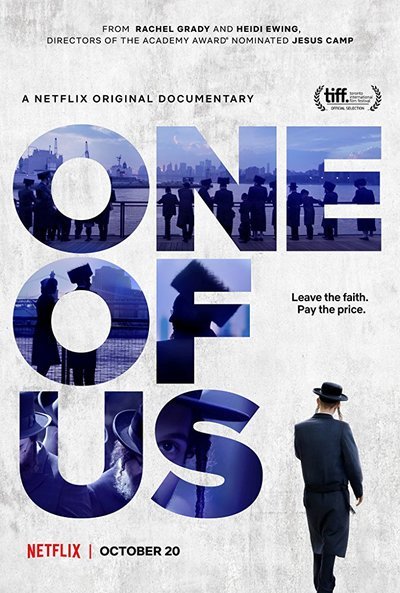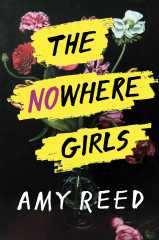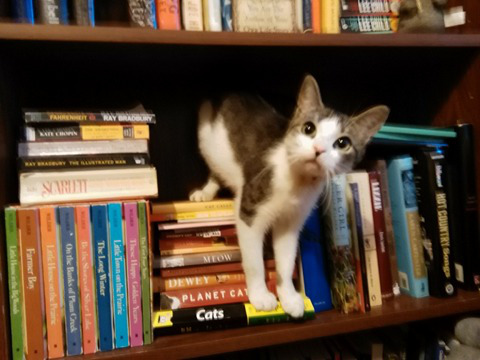-
ONE OF US
Netflix
Reviewed by: Harvey Karten, CompuServe Film d-based on Rotten Tomatoes
Grade: B
Director: Heidi Ewing, Rachel Grady
Written by: Heidi Ewing, Rachel Grady
Cast: Etty, Ari, Luzer
Screened at: Critics’ link, NYC, 9/28/17
Opens: October 20, 2017 streaming

It’s good to fit in; in fact for teenagers it’s everything. Look around at young people and you’ll see them tapping away at their iPhones as though to prove to passersby and to themselves that they’re A-OK. You should have little trouble fitting in with a group that dresses like you, talks like you, sharing your culture including such all-important details is how many kids you’ll have. That’s not all: one crowd you hang with allows you to avoid the anxiety of thinking about the purpose of life. They already know, and so do you. In fact 98% of this particular community remain together for life, only 2% quitting the fold. We’re talking about Hasidim, the ultra-orthodox Jews who dress in long black coats, have payos, or round curlers around their ears, wear funny hats, and are never sunburned because of all the time they spend indoors, as kids studying Talmud. Hasidim are an insular group. The overwhelming majority, those who remain, can prompt the congregations to say “You’re one of us.”“One of Us,” a documentary written and directed by Heidi Ewing and Rachel Grady, takes on Hasidic people, getting their exposure from from two women well known in the film community for “Jesus Camp” (about kids who attend summer evangelical camp each hoping to become the next Billy Graham); and “Detropria” (about the sad story of Detroit after the loss of its manufacturing base). “One of Us” takes place principally in two areas of Brooklyn, Williamsburg and Borough Park, each of the two attracting a particular sect within the Hasidic community—though the divisions are not discussed by Ewing and Grady. The film shines a light on three young Hasidic folks who bolted the community, each confessing to problems arising from the schism while at the same time praising their lives in the secular world.
Ari, who left the community while still a teen, says that he is “tired of living a lie.” The barber cuts the fellow’s payos amid Hasidic onlookers across the street, and though he is no longer in the insular community, he still practice Judaism and wears a kippa, or yarmulke. Perhaps the easiest rebel to like is Luzer Twersky, who toyed with a potential separation by sneaky visits to Blockbuster (remember them?) and who had no idea what the larger world was like until he took in some movies.
The most harrowing consequence of splitting finds Etty, who informs us about arranged marriage by noting that she and her prospective husband had a courtship of thirty minutes together, perhaps not even looking at each other. This is sad: you figure that you’re going to have at least five babies with this one guy, so maybe you should spend a year dating before you realize that he’s tolerable and nice to be intimate with? Since even the secular judge in the Family Court must abide by the law that the children of a divorcing couple should remain with their regular life-style, the father, who remains in the community, wins custody of the whole lot while the ex-wife is lucky to get one day of supervised visitation. Never mind that the man was abusive.
The film plugs an agency called Footsteps, which counsels Hasidim who have left, and who have serious problems getting jobs given that they had grown up without computers, internet, or TV. Because of these limitations, a large percentage of Hasidim live on government grants. After you see this film, take a guess: how many secular or non-Hasidic viewers will decide to join this group, which in New York is 300,000 strong? Probably less than the two percent who leave.
Unrated. 95 minutes. © Harvey Karten, Member, New York Film Critics Online
Comments, readers? Agree? Disagree? Why? Name(required) Email(required) Website Comment(required)
ONE OF US – movie review
Related articles
Related books






